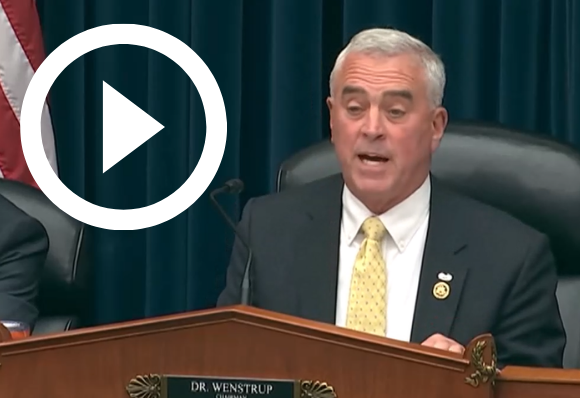Chairman Wenstrup Delivers Opening Remarks at COVID Select’s Final Hearing
Members and government witnesses set to evaluate lessons learned during the COVID-19 pandemic
WASHINGTON — Select Subcommittee on the Coronavirus Pandemic Chairman Brad Wenstrup (R-Ohio) opened today’s hearing titled “Preparing for the Next Pandemic: Lessons Learned and the Path Forward” by detailing the serious flaws in the government’s response to the COVID-19 pandemic. Public health agencies failed the American people in many ways, such as by issuing unscientific recommendations, keeping healthy children out of schools, forcing businesses to close without cause, and mandating vaccines that stripped away freedoms. Chairman Wenstrup explained that over the last two years, the Select Subcommittee has conducted a comprehensive investigation of the government’s pandemic response and detailed important reforms that must be implemented by the public health system before a future crisis strikes. It is to the responsibility of America’s public health officials to learn from the failures of the COVID-19 pandemic and implement an improved response in the future. Chairman Wenstrup concluded his opening remarks with a clear message that stronger oversight, better accountability, and reformed structure within our agencies is essential to protect future generations from similar, government failures.
Below are Select Subcommittee Chairman Wenstrup’s remarks as prepared for delivery:
Good afternoon. I would like to thank the witnesses for their testimony at the Select Subcommittee’s final hearing.
The COVID-19 pandemic stands as one of the most devastating crises in our nation’s history. It claimed the lives of millions of Americans, disrupted livelihoods, and took a profound physical, emotional, and economic toll on families and communities across the country.
Sadly, this will not be the last pandemic. There will be others that test our nation’s preparedness and resiliency in the future.
We are here today to look at the lessons learned from the COVID-19 pandemic in order to prepare for and hopefully prevent the next one.
In the last two years, this Select Subcommittee has sent 118 investigative letters, conducted 38 transcribed interviews, held 25 hearings, and reviewed nearly one million pages of documents.
The work of the Select Subcommittee revealed serious flaws in the government’s response to the pandemic, underscoring the need for reform.
We saw inconsistent, contradictory guidance from the CDC that sowed confusion and diminished trust.
Students were out of the classroom and told to attend school remotely; even when the science clearly demonstrated it was safe for them to be back in the classroom.
We saw Americans pressured to receive a vaccine they were assured would make them a “dead end for the virus” and prevent reinfection and transmission – something that was known to be false based on the vaccine trials.
And, at the NIH, there was a glaring lack of oversight over federal grants that posed risks to public health and national security and millions in taxpayer dollars funded risky gain-of-function research in China.
We found nefarious behavior by several federally funded actors – actions that betray the trust of the American citizens.
We must learn from these errors, take the lessons learned to heart, and make fundamental changes.
We must establish clearly defined roles with an overarching structure that empowers agencies to act swiftly and effectively in mitigating the spread of novel viruses.
It is essential for institutions, such as NIAID and CDC, to execute their assigned missions, functions, and tasks and NOT stray out of their respective lanes.
For example, NIAID is entrusted with vaccine development while the CDC is tasked with controlling and containing the spread of diseases.
Throughout the pandemic, NIAID encroached into CDC’s lane by advising on matters pertaining to containing the spread creating confusion among the American people.
Poor decisions made by federal agencies shattered trust in our public health institutions and left Americans questioning the very leadership that was supposed to protect them.
To be successful in the next pandemic, our federal public health institutions must be accountable to the people again.
To be successful, our health organizations must do what they are supposed to do: protect Americans.
Stronger oversight, better accountability, and improved structure within our agencies are essential. Congress must consider a dedicated authority to oversee agency practices, ensuring that agencies act solely within their areas of statutory responsibilities and subject matter expertise, and insisting that public health decisions are transparent, consistent, and credible.
Let today’s hearing be a step toward lasting reforms that will protect future generations from similar crises. Thank you, and I look forward to a strong, on topic discussion today.
I would now like to recognize Ranking Member Ruiz for the purpose of making an opening statement.
###
